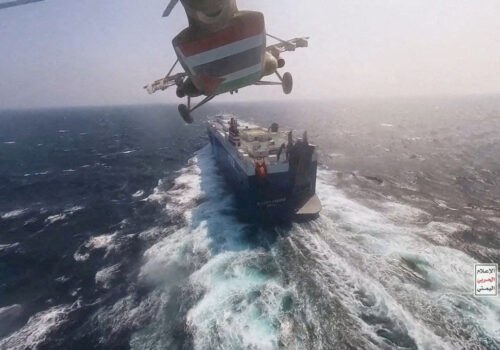Houthi attacks in the Red Sea hurt global trade and slow the energy transition
Recent attacks on commercial ships in the Red Sea have underscored the importance of seaborne international trade, and challenged the role of the United States in safeguarding commerce in the global commons. Maritime choke point disruptions have worldwide consequences because the price of oil is set globally. Simply increasing oil supply will not solve the problem of a major disruption, such as in the Strait of Hormuz, which has been overtly threatened by Iran. This is why the United States has a deep interest in freedom of navigation. Maritime trade of energy is of fundamental importance to the security of supply for energy and to the price felt by consumers worldwide. In addition, the effects of a major disruption to freedom of navigation would hold many damaging but indirect consequences—including slowing progress on addressing climate change.
The danger created by Houthi attacks
The Houthi movement, or Ansar Allah, is a Shia Islamist group that seeks to maintain control of critical territory in Yemen. It operates as a proxy group for Iranian influence, especially the Islamic Revolutionary Guard Corps. The Houthi movement has ramped up attacks on merchant vessels transiting the Red Sea since November 19, 2023, according to US Central Command.
The United States’ response to the attacks, Operation Prosperity Guardian, concentrates naval assets and command-and-control bandwidth on the Bab el-Mandeb Strait, wedged between the Horn of Africa and the southwestern corner of the Arabian Peninsula. It is a key choke point for commercial traffic transiting between the Arabian Sea and Red Sea toward the Suez Canal—another choke point through which more oil is flowing than ever before.
Due to Russia’s invasion of Ukraine and the subsequent trade diversion, the Suez Canal is increasingly used for Middle East-to-Europe flows of energy, as well as Russia-to-India shipments. About 8.8 million barrels per day of oil and oil products utilized the Suez transit in the first half of 2023, or about 12 percent of maritime oil trade.
Operation Prosperity Guardian has engaged Houthi drones, surface-to-ship ballistic missiles, small combatant vessels, and other arms in defense of merchant traffic and naval assets. However, the operation has thus far failed to deter further Houthi attacks and provide assurance of safe passage to commercial vessels transiting the Red Sea.
In order to restore deterrence, the United States and the United Kingdom are conducting airstrikes against Houthi military infrastructure. These actions are not only necessary to restore the safety of trade through the Suez Canal, but to assure the principle that maritime trade cannot be disrupted by force.
The waves rule energy trade
Freedom of navigation matters deeply for preserving the security and efficiency of global energy markets. Forty percent of maritime trade by weight consists of oil, coal, gas, or petrochemical products, per the United Nations Conference on Trade and Development.
Thus far, the Houthis have largely not targeted vessels engaged in energy trade, perhaps stemming from a desire to avoid an environmentally catastrophic oil spill along Yemeni shores, which was only narrowly avoided in August as the oil tanker FSO Safer, abandoned off of Yemeni shores, was successfully drained of its contents.
The Houthis are also likely to avoid drawing Arabian Gulf states deeper into the conflict. Most Gulf economies are deeply dependent on maritime energy trade—hydrocarbon exports are responsible for 40 percent of Saudi and Qatari gross domestic product (GDP), and 50 percent of Kuwait’s GDP.
Additionally, the Houthis’ Iranian patrons wish to avoid antagonizing major oil importers China and India, or partners such as Russia. Last week, a Houthi spokesman told a Russian news channel that Chinese and Russian cargoes would not be targeted.
The prospect for escalation, and the potency of the threat which the Houthis have displayed, is substantial. Major oil traders such as BP, Shell, and Trafigura have now suspended shipments through the Red Sea completely.
Although the United States conducts limited oil and liquefied natural gas trade through the Suez Canal, the risk of a supply disruption in this critical choke point matters to US economic security, as oil prices are set globally. Moreover, the United States must ensure that its European allies retain access to energy supplies amid Russia’s invasion of Ukraine. Regardless, it is the threat of escalation, in the Red Sea or other choke points such as the Strait of Hormuz, and the broken principle of freedom of navigation that most acutely threatens US interests.
US energy trade rules the waves?
For the United States, free maritime commerce has long been central to its economic prosperity, from the nation’s founding as a merchant power to the modern era, when maritime vessels account for 40 percent of US international trade by value and 70 percent by weight.
The United States’ rising oil exports underscore how its economic competitiveness is intertwined with the global maritime commons. The United States has emerged as the world’s leading producer of oil, as US exports of oil and oil products have consistently been above ten million barrels per day since early 2023, with seaborne exports often accounting for more than seven million barrels per day of this trade.
Global maritime trade of oil is estimated to be approximately forty-three million barrels per day, according to commodity services firm Kpler, and the US export share of maritime oil trade has expanded dramatically since the crude oil export ban was lifted in 2015.
While the Red Sea is not a major transit point for US oil exports, which primarily traverse the Atlantic crossing or Panama Canal, it is not in the US national interest for any waters to be closed to energy trade. If energy vessels are required to reroute amid security threats and a fragmented global commons, shipping costs and energy prices will rise, lowering world economic growth. Secondly, although some US energy companies will benefit temporarily from rising prices, overall US energy and economic security suffers, as the US remains a large oil importer, typically receiving over six million barrels per day due to domestic refinery configurations. Moreover, disruptions to global supply chains would reverberate across other sectors of the US economy that rely on international trade.
It is in the economic interest of the United States to ensure that the global maritime commons remains free from disruption.
Threats to freedom of navigation are also threats to net-zero emissions goals
Maritime security does not only affect fossil energy. If freedom of navigation is no longer secured—if merchant vessels can be disrupted or even sunk by armed groups—then the clean energy transition will face disruption. Shipping costs and insurance rates will rise sharply amid greater uncertainty.
Additionally, the inputs for clean energy supply chains often transverse many different maritime nodes across the globe, from mine to factory to final installation. For instance, cobalt that is mined in the Democratic Republic of the Congo may be refined in Finland, assembled into a battery in Japan, and shipped to an electric vehicle factory in the United States. With maritime supply chains facing greater uncertainty, firms will require greater redundancy and inventory stockpiling.
These dynamics will lower efficiency and increase inflation. The snarling of supply chains and resultant inflation will also necessitate higher interest rates, all things being equal. Higher interest rates, in turn, will pressure capital-intensive clean energy projects by raising financing costs. The global clean energy transition will be slowed considerably if freedom of navigation is no longer a reasonable assumption of seaborne trade.
In sum, a world without freedom of navigation would represent a disaster for not only the world economy but also squash any aspiration of reaching net-zero emissions by 2050.
Will Tobin is an assistant director at the Global Energy Center.
Joseph Webster is a senior fellow at the Global Energy Center.
This article represents their own personal opinion.
Further reading
Fri, Jan 12, 2024
Six big questions about US-led strikes against the Houthis, answered
MENASource By Kirsten Fontenrose
Ahead of authorizing the strikes, Biden had to carefully consider arguments for and against conducting strikes to limit the Houthis’ capacity to continue waging war on international shipping.
Thu, Jan 11, 2024
Will US-UK strikes against the Houthis halt their Red Sea aggression?
Fast Thinking By
Our experts break down the US-UK strikes in Yemen and the prospects for a wider regional war.
Thu, Jan 18, 2024
Experts react: What’s really going on with Pakistan and Iran exchanging attacks?
New Atlanticist By
Pakistan just conducted airstrikes in southeastern Iran, two days after Iran used missiles and drones to strike western Pakistan. Atlantic Council experts explain what’s going on.
Image: Armed men stand on the beach as the Galaxy Leader commercial ship, seized by Yemen's Houthis last month, is anchored off the coast of al-Salif, Yemen, December 5, 2023. REUTERS/Khaled Abdullah//File Photo


